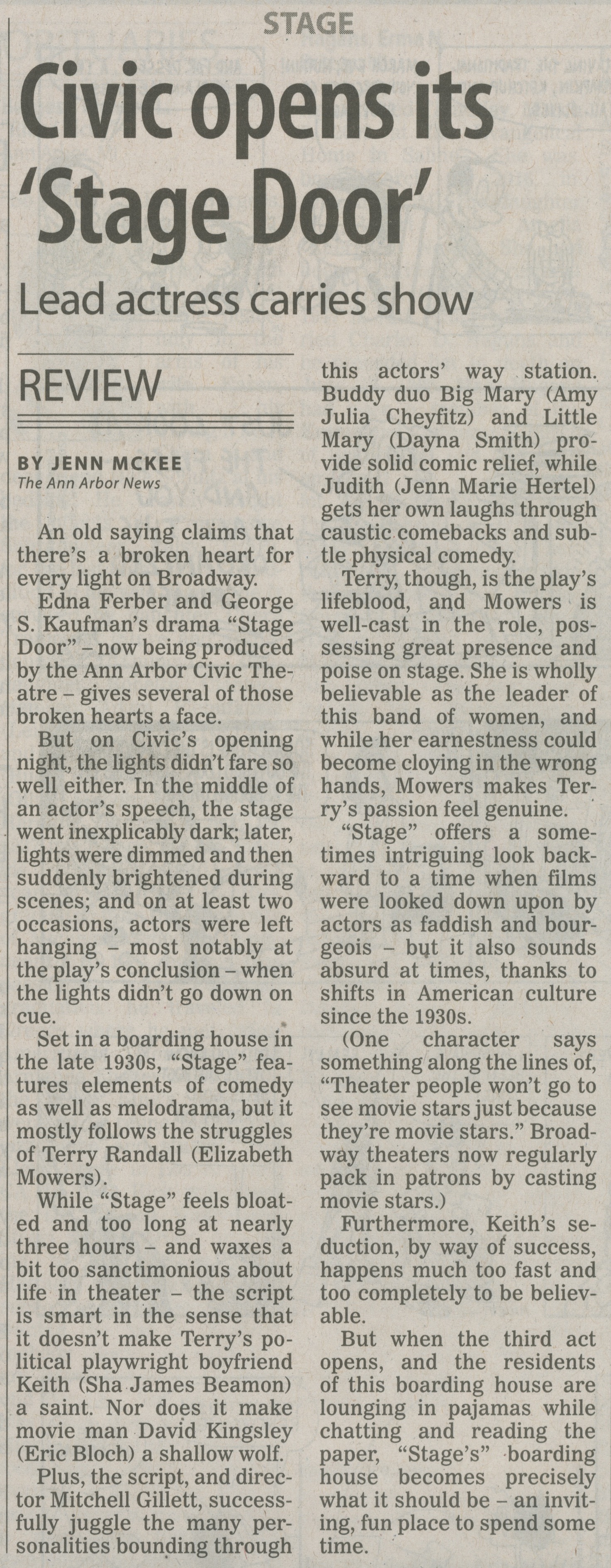Civic Opens Its 'Stage Door'

STAGE
Civic opens its 'Stage Door'
Lead actress carries show
REVIEW
BY JENN MCKEE
An old saying claims that there’s a broken heart for every light on Broadway.
Edna Ferber and George S. Kaufman’s drama “Stage Door” - now being produced by the Ann Arbor Civic Theatre - gives several of those broken hearts a face.
But on Civic’s opening night., the lights didn’t fare so well either. In the middle of an actor’s speech, the stage went inexplicably dark; later, lights were dimmed and then suddenly brightened during scenes; and on at least two occasions, actors were left hanging - most notably at the play’s conclusion - when the lights didn’t go down on cue.
Set in a boarding house in the late 1930s, “Stage” features elements of comedy as well as melodrama, but it mostly follows the struggles of Terry Randall (Elizabeth Mowers).
While “Stage” feels bloated and too long at nearly three hours - and waxes a bit too sanctimonious about life in theater - the script is smart in the sense that it doesn’t make Terry’s political playwright boyfriend Keith (Sha James Beamon) a saint. Nor does it make movie man David Kingsley (Eric Bloch) a shallow wolf.
Plus, the script, and director Mitchell Gillett, successfully juggle the many personalities bounding through this actors’ way station. Buddy duo Big Mary (Amy Julia Cheyfitz) and Little Mary (Dayna Smith) provide solid comic relief, while Judith (Jenn Marie Hertel) gets her own laughs through caustic comebacks and subtle physical comedy.
Terry, though, is the play’s lifeblood, and Mowers is well-cast in the role, possessing great presence and poise on stage. She is wholly believable as the leader of this band of women, and while her earnestness could become cloying in the wrong hands, Mowers makes Terry’s passion feel genuine.
“Stage” offers a sometimes intriguing look backward to a time when films were looked down upon by actors as faddish and bourgeois - but it also sounds absurd at times, thanks to shifts in American culture since the 1930s.
(One character says something along the lines of, “Theater people won’t go to see movie stars just because they’re movie stars.” Broadway theaters now regularly pack in patrons by casting movie stars.)
Furthermore, Keith’s seduction, by way of success, happens much too fast and too completely to be believable.
But when the third act opens, and the residents of this boarding house are lounging in pajamas while chatting and reading the paper, “Stage’s” boarding house becomes precisely what it should be - an inviting, fun place to spend some time.